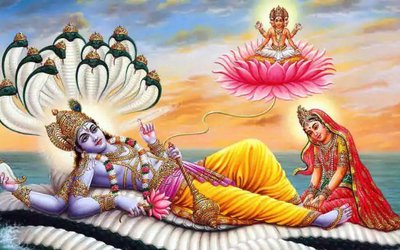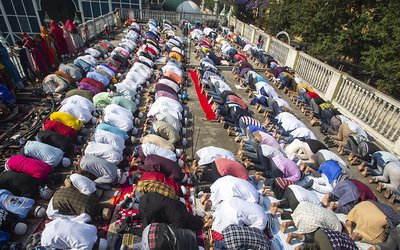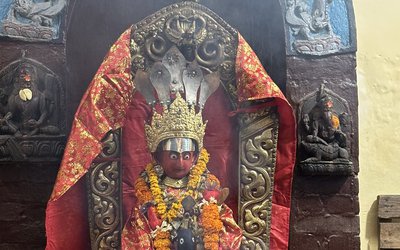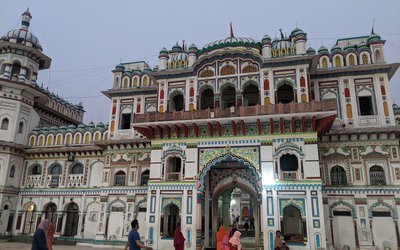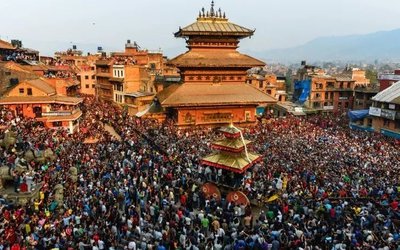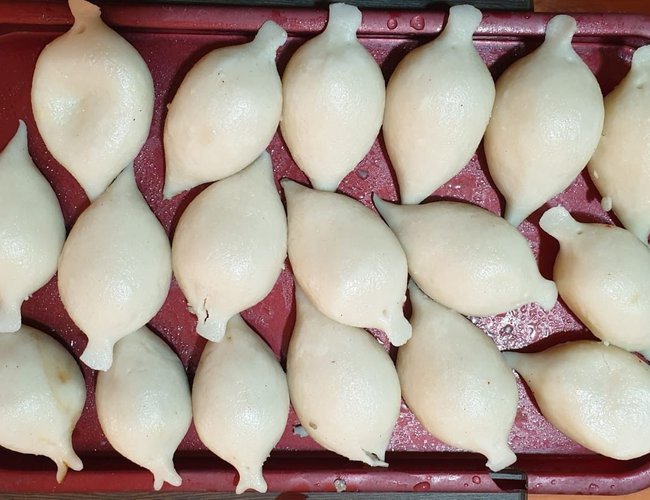
Newar community celebrated Yomari Puni todayday by worshipping the goddess Annapurna and eating yomari (steamed dumplings with sweet fillings).
Yomari Punhi is a harvest festival celebrated by the Newari people. The festival gets its name from Yomari, fresh-harvest rice sweetmeat, prepared especially during the festival and enjoyed by all.
People of the Kathmandu Valley offer worship to Annapurna, the Goddess of Grains, for the rice harvest on this full moon day. According to the legends Suchandra and Krita, a married couple, first experimented with fresh yield of rice from their field at present day Panauti in ancient times. And what took shape turned out to be known as Yomari.
Fresh Yomari, a rice sweetmeat, filled with molasses and sesame seed, enjoyed by Newars of Kathmandu valley during Yomari Punhi, a harvest festival.
The new delicacy was eventually distributed among the villagers. As the food was liked by all, the bread was named Yomari, which literally means ‘tasty bread’ in Newari language. Yomari is a sweetmeat of rice-flour (from the new harvest) dough, shaped like fig and filled with molasses and sesame seeds, which is then steamed.
Fresh Yomari, a rice sweetmeat, filled with molasses and sesame seed, enjoyed by Newars of Kathmandu valley during Yomari Punhi, a harvest festival.
This delicacy is the chief item on the menu during the post-harvest celebration of Yomari Punhi. Groups of kids go to the neighborhood to requesting for Yomari cakes from housewives in the evening. Sacred masked dances are performed in the villages of Harisiddhi and Thecho at the southern end of the valley to mark the festival.
Yomari Punhi, meaning the full moon of yomari, is one of the most popular Newar festivals and is observed every year during the full moon of December. A yomari is a confection of rice flour (from the new harvest) dough shaped like fish and filled with brown cane sugar and sesame seeds, which is then steamed. This delicacy is the chief item on the menu during the post-harvest celebration of Yomari Punhi.
On this full moon day, people of the Kathmandu Valley offer worship to Annapurna, the goddess of grains, for the rice harvest. Groups of kids go around neighborhood to beg yomari cakes from housewives in the evening. Sacred masked dances are performed in the villages of Hari Siddhi and Thecho at the southern end of the Valley to mark the festival.
In a yomari people keep chaku a chocolate-like food or khuwa a ricotta-cheese-like dairy product.It is very tasty. This is also one of the main festival celebrated only in newar community.
Matinaa Paaru
On the day after Yomari Punhi, a day alike Valentines Day is observed. According to Basu Pasa's historical book ‘Kantipur’, among different shapes yomari, 'Bayo' symbolizes the male sexual organ whereas the triangle shaped with two points at the end known as 'Mayo' yomari suggests the female sexual organ and represents father and mother respectively.
The Bayo yomari is filled with molasses and sesame seeds while the Mayo yomari is filled with pulses. So, Yomari is considered to be symbolic combination of sex. The culture of ‘Yomari Fonegu’ relates with love and romance. People went homes to home, toles to toles to ask Yomari, and at that time they got a chance to sneak peak and talk with their loved ones. In traditional days, society was restrictive with love. Yomari Punhi’s ‘Yomari Fonegu’ culture was utilized as a cruising day in those times, and lovers would secretly meet the other day. There were no mobiles, no phones. People would write in particular expressions (as the sun starts to get red, down from Buincha hiti falcha, behind the bamboo trees)
Some people also relate Matinaa Paaru with story of Majipaa Lakhey. Majipa Lakhey’s love story is another mythical love story, where a Lakhey (demon) turns into a caretaker after falling in love with a girl from Kathmand
- India’s External Affairs Ministry’s Senior Officials Says Indo-Nepal relations are ever expanding
- Jul 05, 2025
- Bhutan Government Unveils Three Pronged Strategies To Tackle Skilled Migration Crisis
- Jul 05, 2025
- Weather Forecast: Generally Cloudy Across The Country With Heavy Rain At One Or Two Places Bagmati And Koshi Provinces
- Jul 05, 2025
- FNCCI President Dhakal Urges British Companies to Invest in Nepal
- Jul 04, 2025
- Nepal Is Expected To See 60,000 People Infected with Dengue This Year
- Jul 04, 2025
